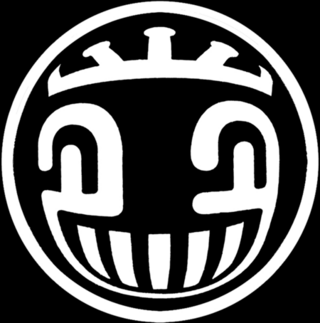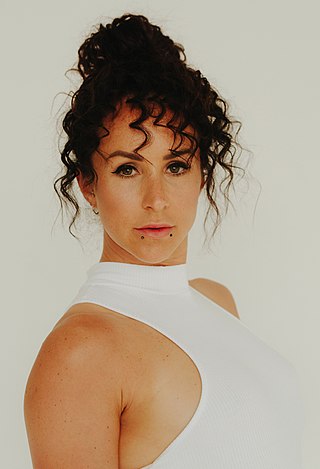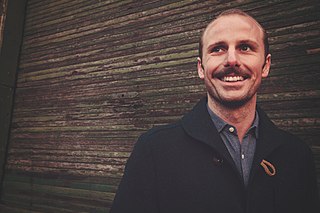Related Research Articles

A rave is a dance party at a warehouse, club, or other public or private venue, typically featuring performances by DJs playing electronic dance music. The style is most associated with the early 1990s dance music scene when DJs played at illegal events in musical styles dominated by electronic dance music from a wide range of sub-genres, including drum and bass, dubstep, trap, break, happy hardcore, trance, techno, hardcore, house, and alternative dance. Occasionally live musicians have been known to perform at raves, in addition to other types of performance artists such as go-go dancers and fire dancers. The music is amplified with a large, powerful sound reinforcement system, typically with large subwoofers to produce a deep bass sound. The music is often accompanied by laser light shows, projected coloured images, visual effects and fog machines.

The Haçienda was a nightclub and music venue in Manchester, England, which became famous during the Madchester years of the 1980s and early 1990s. It was run by the record label Factory Records.

A free party is a party "free" from the restrictions of the legal club scene, similar to the free festival movement. It typically involves a sound system playing electronic dance music from late at night until the time when the organisers decide to go home. A free party can be composed of just one system or of many and if the party becomes a festival, it becomes a teknival. The word free in this context is used both to describe the entry fee and the lack of restrictions and law enforcement.

Spiral Tribe is an arts collective and free party sound system formed in 1990. It organised free parties, festivals and raves in the UK and later Europe in the 1990s. Spiral Tribe was involved in the Castlemorton Common Festival, and members have released music on labels such as Network 23 and Big Life Records. The sound system combined pagan beliefs with New Age traveller culture and rave to form teknivals. After a hiatus, the collective reformed as SP23 in 2011 and continues to organise events.

Above & Beyond are an electronic music group consisting of English musicians/DJs Jono Grant, Tony McGuinness and Finnish musician/DJ Paavo Siljamäki. Formed in 2000, they are the owners of London-based electronic dance music labels Anjunabeats and Anjunadeep, and also host a weekly radio show titled Group Therapy Radio.

Carl Cox is a British house and techno club DJ, radio DJ and record producer. He is based in Frankston, Victoria, Australia.

Andrew James Weatherall was an English musician, DJ, songwriter, producer and remixer. His career took him from being a DJ in the acid house movement of the late 1980s to being a remixer of tracks by Happy Mondays, New Order, Björk, the Orb, the Future Sound of London, My Bloody Valentine, Saint Etienne, Primal Scream, Moby and James.

The Castlemorton Common Festival was a week-long free festival and rave held in the Malvern Hills near Malvern, Worcestershire, England, between 22 and 29 May 1992. The media interest and controversy surrounding the festival, and concerns as to the way it was policed, inspired the legislation that would eventually become the Criminal Justice and Public Order Act 1994.

Exodus Collective was a community collective and sound system formed in 1992, in the Marsh Farm area of Luton, England. It organised free parties and became involved in housing, social exclusion, and community projects, founded upon the principle of DIY culture. The group squatted buildings and repeatedly came into conflict with Bedfordshire Police, which by 1995 had resulted in Bedfordshire County Council voting for a public inquiry into alleged police harassment. The licence of a pub owned by the mother of people in the collective was revoked, a decision which was later overturned by a judicial review.

Robert Ferguson, known professionally as Fergie, is a Northern Irish DJ and electronic music artist from Larne. He has been an internationally touring DJ and a music producer for over 20 years. He presented a radio show on BBC Radio 1 for over four years while recording 13 Essential Mixes for the station. He was featured in the DJ Mag Top 100 DJs poll seven consecutive years and currently holds the record for the highest new entry since the poll began, achieved when he was voted 8th in 2000.

Tribal Gathering is the original British electronic dance music festival that between 1993 and 2004 catered for different types of dance music cultures such as techno, house and drum & bass. After 18 years, Tribal Gathering returns in 2023 for a two-day event to celebrate its 30th anniversary.
Sankeys is a nightclub franchise with its first nightclub in Ancoats, Manchester, United Kingdom. The company formerly operated a nightclub in Playa d’en Bossa, Ibiza and opened a New York City venue in 2013.

Hannah Alicia Smith is a British house music DJ and producer better known by her stage name Hannah Wants, and a former professional footballer.

Harry Agius, known professionally as Midland, is a British DJ, producer and record label owner who began his career in Leeds and is now based in London. He founded his label Graded in 2013 as an output for his own productions.
Felix Clary Weatherall, known by his stage name Ross from Friends, is a British electronic music producer and DJ. He is signed to the Brainfeeder label, and released his debut album Family Portrait in July 2018, being noted as "one to watch" by The Guardian.
Deconstructed club, also known as post-club or deconstructed music, is an experimental style of electronic dance music characterized by a post-modernist approach and an abrasive or dystopian tone. It stands opposed to the tropes of mainstream club styles, often dispensing with four-on-the-floor beats and stable tempo while mixing eclectic or abrasive sources.

Shoom was a weekly all-nighter dance music event in London, England, between September 1987 and early 1990. It is widely credited with initiating the acid house movement in the UK. Shoom was founded by Danny Rampling, then an unknown DJ and record producer, and managed by his wife Jenni. The club began at a 300-capacity basement gym on Southwark Street in South London. By May 1988, its growing popularity necessitated a move to the larger Raw venue on Tottenham Court Road, Central London, and a switch from Saturday to Thursday nights. Later relocations were to The Park Nightclub, Kensington and Busby's venue on Charing Cross Road.
Sherelle Camille Thomas, known mononymously as Sherelle, is a British DJ and electronic musician. With a background in dancehall and rave music, Sherelle is best known for her DJ sets and mixes. Sherelle is also known for co-founding the label Hooversound with Naina and for founding Beautiful, a label and musical project for Black and LGBT musicians.
Jaguar Bingham is a British disc jockey and radio presenter who presents on BBC Radio 1 and co-hosts the annual International Music Summit Ibiza.
Emma Kirby, known as Elkka, is a Welsh producer, vocalist, and DJ. With a background of songwriter and vocalist for Elkka is best known for winning the Essential Mix of the Year (BBC1) in 2021. She is also known as the co-founder of femme culture, which she founded with her partner Alex Lambert, an inclusive queer platform. The label organizes the annual HeForShe compilation, and all profits go to the charity U.N. Women.
References
- 1 2 "New book explores the 90s heyday of DiY Sound System". Mixmag. Retrieved 7 March 2022.
- ↑ ed. Low M. and Barnett C., (2004) Spaces of Democracy: Geographical Perspectives on Citizenship, Participation and Representation, SAGE Publications, ISBN 0-7619-4734-5
- 1 2 3 4 Dicker, Holly (19 April 2022). "90s rave crew DiY Sound System: 'We definitely sacrificed our sanity'". The Guardian. ISSN 0261-3077 . Retrieved 11 July 2023.
- ↑ "History of '90s UK rave sound system DiY Collective celebrated in new book, Dreaming in Yellow". DJMag.com. 10 February 2022. Retrieved 7 March 2022.
- 1 2 Scott Oliver (20 August 2014). "The Raving Crew Who Were Named 'The Most Dangerous People in the UK'". Vice.
- ↑ Guest, Tim (11 July 2009). "Tim Guest tells the story of how the state crushed the early 90s free party scene". The Guardian. Retrieved 7 March 2022.
- ↑ ""It's never too far": The inside story of Castlemorton — history's most infamous rave". Mixmag. Retrieved 7 March 2022.
- ↑ "DIY: Can-do Attitude!". DJ Mag. 4 November 2014.
- ↑ Reynolds, S., 1998, Energy Flash, Picador, ISBN 0-5712-8914-2
- ↑ Collin, Matthew (1997). Altered State. UK: Serpent's Tail. p. 197. ISBN 1-85242-604-7.
- ↑ Collin, Matthew (1997). Altered State. UK: Serpent's Tail. p. 198. ISBN 1-85242-604-7.
- ↑ "UK deep house pioneer Pete Woosh has died". Mixmag. Retrieved 7 March 2022.
- ↑ "UK free party pioneer Pete 'Woosh' Birch has died". DJMag.com. 7 October 2020. Retrieved 7 March 2022.
- ↑ "UK house and free party scene pioneer Pete 'Woosh' Birch has died".
- ↑ "Simon DK, founding member of Nottingham collective DiY, has died". Resident Advisor. Retrieved 11 July 2023.
- ↑ "Simon DK, legendary DJ and founding member of DiY Sound System, has died". Mixmag. Retrieved 11 July 2023.
- ↑ "Simon DK Smith, co-founder of DiY Sound System, dies, aged 60". DJMag.com. 7 July 2023. Retrieved 11 July 2023.
- ↑ "Grace Sands - Biography - RA". Resident Advisor .